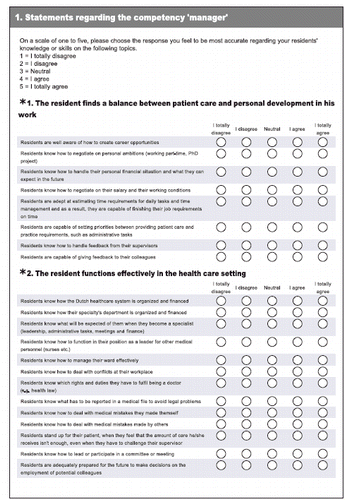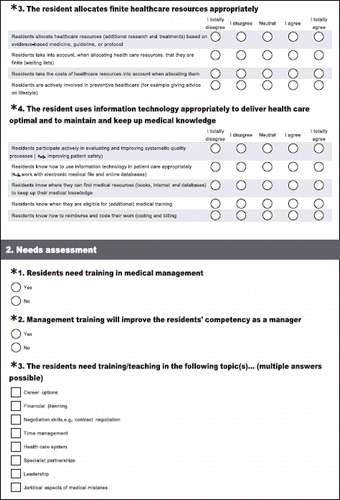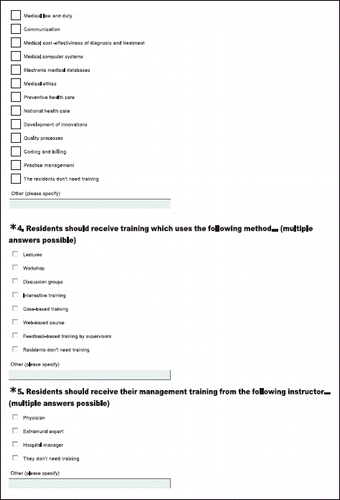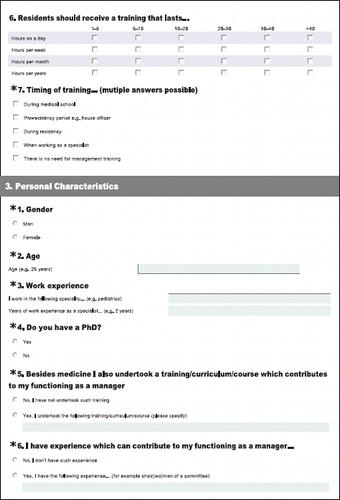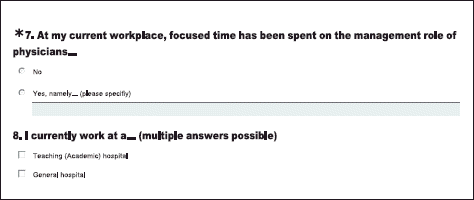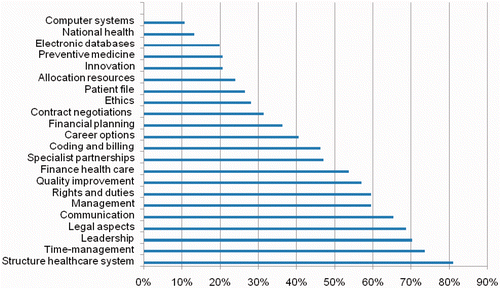Abstract
Background: The Dutch postgraduate medical training has been revised to focus on seven competencies. The role as manager is one of these competencies. Recent studies show that this competency receives little attention during the residency training. In an earlier study, we discovered that residents perceived their competency as managers to be moderate.
Aim: In this study, we investigated how medical specialists perceived the managerial competencies of medical residents and their need for management education.
Methods: In September 2010, a 46-item questionnaire was designed which examined medical specialists’ perceptions of the competency and needs of residents in the field of medical management. Two hundred ninety-eight specialists were invited via email to participate.
Results: Hundred twenty-nine specialists (43.3%) responded to our survey. They rated the residents’ competencies in contract negotiating skills, knowledge of the healthcare system, and specialist department poorly. They felt that residents were competent in updating their medical knowledge. Ninety-four percent reported a need for training in management among residents. Preferred topics were time management and healthcare organization. The preferred training method was a workshop given during residency by an extramural expert.
Conclusion: Dutch medical specialists perceive the management competencies of residents in some areas to be inadequate. They feel that training in medical management during residency is necessary.
Introduction
On the first of January 2005, all residency-training programs in the Netherlands formally began using a new competency-based curriculum to train their medical residents. Like the CanMEDS framework, the new curriculum comprised seven competencies that residents were expected to possess upon graduation (i.e., medical expert, communicator, collaborator, manager, health advocate, professional, and scholar; Royal College of Physicians and Surgeons of Canada Citation2011). Six years after its inception, however, the physicians’ role as manager still appears to receive little attention in both the undergraduate and postgraduate training programs. This is concerning, particularly when one considers that in order to practice effectively, physicians should possess good managerial skills. The first studies on this subject date back to the late 70 s and early 80 s and showed that family medicine was one of the first specialties to develop practice-management training during the residency period (Lawson & McConnell Citation1976; Aluise Citation1977; Essex & Jackson Citation1981; Reisman et al. Citation1984; Cordes et al. Citation1989). Only in the last 10–15 years, there has been a broader interest for this subject among other specialties and stakeholders in healthcare delivery, resulting from the increasing costs and challenges related to access and quality of healthcare (Griffiths Citation1983; Horsley et al. Citation1996; Walker & Morgan Citation1996; O’Neil Citation2005; Busari et al. Citation2011). Unfortunately, despite these developments, a number of studies still report that physicians do not feel as adequately prepared for their role as managers as for the other roles (Lieberman & Hilliard Citation2006; Ringsted et al. Citation2006; Busari et al. Citation2008).
In a recent review that we conducted, we found that when a needs assessment was performed among residents or specialists, they all reported a need for management training. We also discovered that management curricula have been incorporated into the medical programs of several institutions and although there was no consensus on the content, duration, timing, and educational methods for management training, all of the implemented programs were evaluated positively (Busari et al. Citation2011).
Based on our observation that the role as manager receives sparse attention in the Dutch postgraduate medical training, we decided to investigate the situation in the Netherlands. In 2009, we designed a questionnaire to examine the perceived competence and needs of Dutch medical residents. We found that residents in the Netherlands perceived their knowledge and skills in certain essential medical management concepts to be inadequate. Sixty percent of the respondents did not feel confident in their (contract) negotiating skills and 56% stated that they lacked sufficient knowledge of how the Dutch healthcare system is financed and organized. About one-third gave neutral ratings in negotiating career prospects, possessing adequate leadership skills, knowledge of the legal aspects of healthcare, and how to deal with medical errors (Berkenbosch et al. Citation2011). The results also showed that the majority (85%) of the residents reported a need for management training (Brouns et al. Citation2010).
These results confirmed the findings in the existing literature and our hypothesis that residents in the Netherlands perceive a lack in managerial knowledge and skills and that the majority would like to receive management training. Since our ultimate goal was to develop a management course for Dutch medical residents, we wanted to examine the problem from different perspectives. There have been several studies on the management needs of medical specialists (Daugird & Spencer Citation1990; Horsley et al. Citation1996; Walker & Morgan Citation1996), but as far as we know there has been no research on how specialists perceive the management competencies of their residents. We decided to investigate how medical specialists perceived the managerial competencies of medical residents and if they felt that residents lacked specific management skills or knowledge in certain areas. We also wanted to investigate what medical specialists thought a management course for the residents should comprise.
Methods
Designing the survey
In September 2010, we designed a survey for the medical specialists based on the previous questionnaire for residents (Brouns et al. Citation2010; Berkenbosch et al. Citation2011). The questionnaire was modified for the new purpose and for review sent to an expert panel consisting of 10 persons of which two were educational psychologists, two were educationalists and six were medical specialists. Based on the feedback we received, we added two questions to the questionnaire (on preventive healthcare and employment of potential colleagues). The final questionnaire consisted of 30 statements about the management competency of residents which covered four areas of practice management, namely: 1. the balance between patient care and personal development, 2. effectively operating within the healthcare setting, 3. allocating finite healthcare resources appropriately, and 4. using information technology to deliver optimal healthcare. The respondents were asked to rank their perceived level of competence of the residents on a five-point Likert scale, with 1: completely disagreeing and 5: completely agreeing with a statement (Appendix). There were seven items which assessed how medical specialists perceived the need for management education among medical residents (training variables). This section not only investigated the need for management training for the residents, but also the preferred management topics, the preferred method of instruction, when the training should take place, and the length of the training. Finally, there were nine questions about the demographic characteristics of the specialists (background variables), i.e., age, gender, years of work experience, possession of a PhD, specialty (surgical vs. non-surgical specialties), hospital (university teaching hospitals, UTHs vs. district teaching hospitals, DTHs), previous management experience (e.g., chair(wo)man of a committee), and previous management education (e.g., a management course) and if they had management training at their current workplace. We were interested to find out whether some of these background variables were associated with the specialists’ perceptions of the management competencies and the management education needs of their residents.
Data collection
We e-mailed this survey to all specialists in the Atrium Medical Center, Heerlen, and to specialists in Maxima Medical Center, Veldhoven, and in the Catharina Hospital, Eindhoven. The pediatricians in Maastricht University Medical Center, Maastricht also received the survey. As the study was a web-based survey (using the Survey Monkey web application) links to the questionnaire were sent to all of the participants by e-mail. They could fill in the questionnaire anonymously. The duration of the survey was 6 weeks and reminders were sent by e-mail twice in Heerlen and once in Veldhoven and Eindhoven. Prior to starting the survey, we sought for and obtained ethical approval from our hospitals research and ethics committee.
Data analysis
Analysis was performed using SPSS, version 17. Descriptive statistics were used to present the demographic distribution of the participants. An explorative factor analysis (EFA) was performed to identify if there were underlying clusters of items (scales) in the questionnaire. Cronbach's alpha analysis was used to test the reliability of the resulting scales and to decide which low-contributing items should be removed from the scale. For the final scales, scale scores were obtained by calculating the mean score of the corresponding items. Whether the specialist's perceptions as expressed by these scale variables are influenced by background variables was investigated using multiple regression analysis. The scale variables formed the dependent variables in the analysis and the background variables were the independent variables. In order to reduce the number of (dummy) variables, we selected the following background variables of interest: gender, work experience_log, management training, management experience, surgical, and PhD degree holder. Gender was defined 0 = male, and 1 = female. Work experience (in years) was expected to have a skewed distribution and was therefore replaced by work experience_log = log10 (work experience). Management training was defined as 0 = no and 1 = yes, management experience was defined 0 = no and 1 = yes. The variable “surgical” was used as a binary version of Specialty and defined as follows: surgical = 1 if specialty = surgery, orthopedics, gynecology, ear, nose, and throat or urology and 0 otherwise. PhD degree holder was defined 0 = no and 1 = yes. The relationship between the perceived need for management training and the background variables mentioned above was investigated by analyzing the corresponding cross tables using Fisher's exact test to assess the significance of the association.
Results
A total of 298 specialists were approached via e-mail to participate in the survey. Of this total, 129 questionnaires were returned (overall response rate: 43.3%). One hundred twenty-one specialists filled in the questionnaire completely. The dropout rate (failure to complete the survey) was 6.0% (n = 8). One of the specialists reported a problem with the questionnaire in the personal characteristics section, which was solved. There were no other reasons given for not completing the questionnaire.
Specialists’ characteristics
The mean age of the specialists was 47.0 years (SD 8.5) (). Seventy-six percent (92/121) of the respondents were male. Specialists from 20 different specialties completed the survey, with pediatrics (25/121, 19.4%), surgery (14/121, 10.9%), and internal medicine (12/121, 9.3%) being the largest response groups. The average years of work experience was 13.2 years (SD 9.1). Fifty-six percent (68/121) of the respondents reported not to have any formal management training at their current workplace, 51.2% (62/121) had management training at some point in their career and 72% (87/121) reported to have had some previous experience in a management or leadership function.
Table 1 Characteristics
Explorative factor analysis
For the 30 competency items, EFA was performed using 4–6 factors consisting of principal components analysis and oblique rotation. After removal of ambiguous items (loading difference less than 0.1) and low loading items (loading less than 0.4), the EFA was repeated. In the reliability analysis, the resulting scales were investigated for items that did not positively contribute to the reliability. Using these indications, three items were removed, and for the remaining set of 27 items a satisfactory four-factor solution was obtained (explained variance equal to 49%). presents the resulting loadings for this solution (loadings <0.1 not shown), with a gray background indicating subsets of items associated with each factor (scale). By the content of their corresponding items, the four scales were indicated “Leadership and Management”, “Organization and Finance”, “Operational Management”, and “Professional Ethics and Health Law”, respectively. The reliability (Cronbach's alpha) of each scale amounted to 0.85, 0.78, 0.72, and 0.81, respectively.
Table 2 Pattern matrix
Perceived levels of knowledge and skills
In general, the specialists perceived the residents’ management competency to be moderate with a mean of 2.95 (SD 0.41) (). From the items in factor 1 “Leadership and Management” (mean 3.08, SD 0.82), the specialists gave the lowest rating to the residents’ abilities to lead or participate in a meeting or committee (mean 2.69, SD 0.75). They gave the highest score to their capabilities to handle received feedback (mean 3.64, SD 0.64).
Table 3 Mean and SD of item and scale scores (five point) and Cronbach's alpha for the scales (N = 129)
The factor “Organization and Finance” had the lowest average score of the four factors (mean 2.35, SD 0.87) and all items within this factor had a lower mean score than the other items. The lowest scores on average were given to the knowledge of the residents of the organization and financing of specialist departments (mean 1.91, SD 0.65), and their knowledge of the organization and financing of the healthcare system (mean 2.07, SD 0.65). The specialists gave the highest score, in this section, to their residents’ competency to handle their personal financial situation (mean 2.61, SD 0.87). The third factor “Operational Management” had the overall highest rating (mean 3.39, SD 0.92). The lowest score in this section was given to the residents’ abilities to allocate scarce resources based on their costs (mean 2.73, SD 0.88). They gave the highest rating to their competency to keep their medical knowledge up-to-date (mean 4.14, SD 0.86). The lowest average score in the last factor “Professional Ethics and Health Law” (mean 2.84, SD 0.79) was given to the residents’ ability to handle mistakes made by others (mean 2.71, SD 0.74). The specialists gave the highest rating to their residents’ knowledge of the rights and duties a doctor has to fulfill (mean 3.09, SD 0.78).
Multiple regression analysis
As presented in , the only variable which had an overall significant influence on the perceived management competency of residents was whether or not the specialist had a doctorate degree (b = 0.20, p = 0.01). Overall, these specialists scored the managerial competency of residents higher. This effect is also seen in the factors “Leadership and Management” (b = 0.18, p = 0.045), “Operational Management” (b = 0.21, p = 0.029), and “Professional Ethics and Health Law” (b = 0.24, p = 0.043). In the last factor, the variable “specialty” also had a significant influence on the given score (b = 0.26, p = 0.036). Surgical specialists rated the residents on average better than their non-surgical colleagues.
Table 4 Multiple regression analysis
Needs assessment
Of the 123 specialists who answered the question, 94% (n = 116) reported a need for management training for their residents. One hundred eleven of them agreed that management education would improve the competency of the residents as managers.
Ninety-four percent of the respondents (n = 121) answered the question “In what topics should the residents be trained in?” by selecting their preferred items. Most specialists chose healthcare system (n = 98), time management (n = 89), leadership (n = 85), and legal aspects of medical errors (n = 83). The topics national health (n = 16) and medical computer systems (n = 13) were least frequently chosen, as shown in .
On the question regarding the preferred training method, “workshop” was most frequently selected (n = 96), whereby a workshop is defined as a course in which interactive (group) assignments are used to translate theory into practice. The other preferred training method was coaching and feedback from supervisors (n = 71). The other methods were chosen less frequently: interactive training (n = 49), case-based training (n = 40), discussion groups (n = 22), lectures (n = 22), and web-based training (n = 21). With respect to the instructor of choice, the specialists preferred “extramural instructors or experts” (n = 111) and “medical specialists” (n = 95), while a third chose “hospital managers” (n = 45).
Hundred twenty-one specialists marked at least one of the options on the ideal time span and period of training. Fourteen of them filled out more than one answer. The preferred duration for the training was 1–5 h during a month (n = 29 times), 5–10 h during a day (n = 20 times) or 10–20 h during a year (n = 18 times). On the question of when during the medical program the training should take place, the respondents answered during residency as the most frequent option (n = 114). Fifty-six percent (68/121) felt that the training should take place after qualification as a specialist, while 35% (42/121) felt that it should take place during the undergraduate medical training.
Finally, we also examined if there was a relationship between the perceived need for management training and gender, specialty, PhD degree holder, previous experience with management tasks and/or training, and the number of years of clinical experience. No significance influence was found, the p-values of all these variables were >0.05.
Discussion
In this article, we set out to investigate how medical specialists perceived the managerial competencies of their residents and if they felt that medical residents need training in healthcare management. We also investigated what medical specialists thought a management course for medical residents should consist of.
The specialists rated the management competency of their residents overall as moderate (mean = 2.95; SD = 0.41), with the highest competency ratings in updating their medical knowledge, handling received feedback effectively, using EBM to allocate resources and knowing when they were eligible for (additional) medical training. They gave the lowest scores for their knowledge on the organization of the healthcare system and the organization of their specialist department and for their ability to negotiate their working conditions and their ability to code and bill their work. When we compared these scores to the results of our previous research on how residents perceived their own management competencies, there were remarkable similarities (Berkenbosch et al. Citation2011). The residents rated their overall competency slightly better with a mean of 3.41 (SD 0.37). They perceived their knowledge and skills on almost the same subjects as mentioned above to be weak or strong. They gave the highest scores to updating their medical knowledge, handling received feedback effectively, and allocating resources based on EBM. The areas in which they rated their competency to be lowest were in how to negotiate on their working conditions, knowledge on how their specialist department is organized, knowledge of the requirements as a specialist, and how the Dutch healthcare system is organized. This comparison suggests that residents and specialists agree on the problematic areas of management competencies among Dutch medical residents. The domains in which they experienced a shortcoming in knowledge and skills are imperative, since negotiating skills are not only essential when debating work conditions but also in several other settings, for example in contract negotiations, patient interactions, nurse–physician collaborations, and when deliberating with colleagues. Comprehension of how the healthcare system is structured and funded is important, because without this knowledge it will be impossible to reform, economize, and improve the current system. The measured shortcoming in knowledge of the national healthcare system also indicates a potential deficit in the Dutch basic medical education (Berkenbosch et al. Citation2011).
We also investigated if there were any variables that influenced the way in which the specialists rated the residents. Having a doctorate degree (PhD) was the only variable which had an overall positive influence on how the specialists rated their residents’ managerial competency. We do not have an explanation for this, but it is possible that specialists who have a PhD are more research oriented and possess a different mindset.
Ninety-four percent of the specialists agreed on the statement that there is a need for management training among their residents. This is higher than the percentage of residents that agreed on that statement (85%; Brouns et al. Citation2010). Knowing this and the fact that the specialists also rated, the overall competence of the residents lower than the residents themselves, may suggest that specialists consider the managerial role to be more important and difficult than the residents do. This could be due to the fact that specialists have a better understanding of what the physician managers’ role entails.
The preferred method of instruction was a workshop with a specialist or extramural expert as training instructor. This matched the preferences of the residents in our previous study (Brouns et al. Citation2010). With regard to the topics that should be taught in a healthcare management course, the most frequently chosen topics by the specialists were knowledge of the healthcare system, time management, leadership, and legal aspects of medical errors. The residents themselves chose negotiation skills, specialist partnerships, knowledge of the healthcare system, and career opportunities (Brouns et al. Citation2010). A closer look at the topics selected by the residents, shows that except for the topic “organization of the healthcare system” the predominant focus of their choices was on their future positions as medical specialists, while the preferred topics of the specialists focused more on the needs for daily patient care. In the literature review, we saw, however, that the most frequently taught subjects were: quality assurance, management related topics, finance related topics, legal issues, personnel, organizational skills, and time management (Busari et al. Citation2011). None of the topics mentioned in the review matched those mentioned by the residents, while the specialists in this study also mentioned time management and legal issues as important items. Nonetheless, both specialists and residents agreed on the fact that the training should take place during residency, although there was little consensus on the time span of the training (Brouns et al. Citation2010). This was similar to the findings in the international literature (Busari et al. Citation2011).
There are some limitations worth mentioning in this study. To begin with, the response rate of 43.3% was not as high as we aimed for, even though we sent two reminders. However, as can be observed from , when we compare the sample of responding specialists to the data available on all Dutch medical specialists, we see that the group of responding specialists is a good representation of the male : female ratio on national level. Also, the percentages of responding specialties seem to reflect the proportions of medical specialties in the Netherlands (Ministerie van Volksgezondheid Welzijn en Sport Citation2012). Although we did not find information on all characteristics, this information does reduce the chance of response bias.
This study only included collaborating hospitals in one region, so it is possible that specialists in other hospitals in the Netherlands have a different opinion on the management competencies of their residents. However, this is unlikely since there is still no formal management training being applied in any of the Dutch medical residency programs.
Conclusions
This study of (Dutch) specialists’ perceptions of residents practice management skills and knowledge shows that they rate their residents’ overall competency as physician managers to be moderate. There are a number of areas where the specialists feel that the residents lack adequate managerial knowledge or skills. Furthermore, 94% of the respondents agreed that there is a need for management training among their residents. This study largely confirms our earlier findings on the perceived management competencies of residents and strengthens our statement that a course in medical management should be considered as a mandatory part of the curricula for residents.
Declaration of interest: The authors report no conflicts of interest. The authors alone are responsible for the content and writing of the article.
References
- Aluise JJ. The physician as manager. “What” and how” of practice management education. J Fam Pract 1977; 4: 305–311
- Berkenbosch L, Brouns JW, Heyligers I, Busari JO. How Dutch medical residents perceive their competency as manager in the revised postgraduate medical curriculum. Postgrad Med J 2011; 87: 680–687
- Brouns JW, Berkenbosch L, Ploemen-suijker FD, Heyligers I, Busari JO. Medical residents perceptions of the need for management education in the postgraduate curriculum: A preliminary study. Int J Med Educ 2010; 1: 76–82
- Busari JO, Berkenbosch L, Brouns JW. Physicians as managers of health care delivery and the implications for postgraduate medical training: A literature review. Teach Learn Med 2011; 23: 186–196
- Busari JO, Verhagen EA, Muskiet FD. The influence of the cultural climate of the training environment on physicians’ self-perception of competence and preparedness for practice. BMC Med Educ 2008; 8: 51
- Cordes DH, Rea DF, Rea J, Vuturo A. A program of management training for residents. Acad Med 1989; 64: 45–46
- Daugird AJ, Spencer DC. The perceived need for physician management training. J Fam Pract 1990; 30: 348, 351–352
- Essex B, Jackson RN. Moneymed: A game to develop management skills in general practice. J R Coll Gen Pract 1981; 31: 735–739
- Griffiths R. The National Health Service management inquiry. Department of Health and Social Security, London 1983
- Horsley S, Roberts E, Barwick D, Barrow S, Allen D. Recent trends, future needs: Management training for consultants. J Manag Med 1996; 10: 47–53
- Lawson JG, McConnell JW. Teaching practice management in a family practice residency. J Med Educ 1976; 51: 858–860
- Lieberman L, Hilliard RI. How well do paediatric residency programmes prepare residents for clinical practice and their future careers?. Med Educ 2006; 40: 539–546
- Ministerie van Volksgezondheid Welzijn en Sport. Overzicht zorgverleners per specialisme. Ministerie van Volksgezondheid Welzijn en Sport, Den Haag 2012
- O’Neil E. Four leadership cornerstones for health care. Center for the Health Professions, San Francisco (CA) 2005
- Reisman A, Mathur K, Mulcahy E. The Case Western Reserve University practice management game: A painless way for physicians to learn managerial skills. J Health Adm Educ 1984; 2: 65–74
- Ringsted C, Hansen T, Davis D, Scherpbier A. Are some of the challenging aspects of the CanMEDS roles valid outside Canada?. Med Educ 2006; 40: 807–815
- Royal College of Physicians and Surgeons of Canada. CanMEDS: Better standards, better physicians, better care. Royal College of Physicians and Surgeons of Canada, Canada 2011
- Walker R, Morgan P. Involving doctors in management. A survey of the management development career needs of selected doctors in NHS Wales. J Manag Med 1996; 10: 31–52
Appendix
